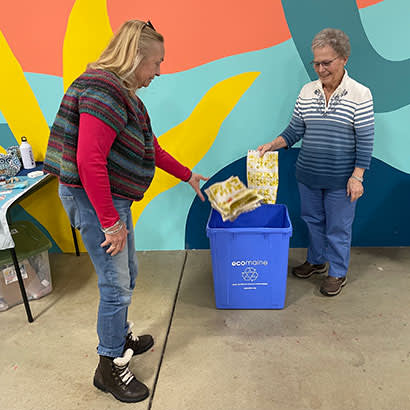
Pictured: Adults recycle Bingo pages in Town of Scarborough, Maine. Photo courtesy of Town of Scarborough.
Stretching across 30,843 square miles, the state of Maine is well known for its extensive coastline, tasty seafood and stunning national park. While immensely beautiful, there are areas of the state that are not as well known. While often overlooked by tourists, these lesser-known regions are home to dedicated park and recreation professionals working to enhance their communities. Since 1989, the state of Maine has had the goal of reaching a recycling rate of 50 percent for all generated municipal solid waste. It is among the few states in the country that have enacted state-wide recycling legislation to encourage recycling efforts.
Local government employees — park and recreation professionals included — have been progressing towards this goal. From the coast of Bigelow Bight to the shores of the Androscoggin River, park and recreation agencies in Maine find innovative and resourceful ways to approach recycling in their communities.
The National Recreation and Park Association (NRPA) has set out to better understand how park and recreation professionals implement recycling programming. In this effort, the towns and cities of Scarborough, Lewiston and Auburn, respectively, spoke with members of NRPA’s Community and Environmental Resilience team to help us gain a better understanding of their approaches to recycling initiatives. Our conversation with these three agencies highlighted the importance of staff and community enthusiasm, education and awareness, and aligning state policy with local implementation.
As many park and recreation professionals know, implementing any initiative on a local level is no easy feat. To do so successfully requires adequate budgeting, staffing, and both community and governmental support. What has made the recycling efforts in Scarborough, Lewiston and Auburn feasible is the enthusiasm of their staff and the supportive participation of their community members.
From informal recycling programs that strive to model Garbage to Garden programs implemented in the local school districts, to organized efforts of clothing recycling through donation bins in parks or partnering with CLYNK to recycle cans, these agencies have resourcefully implemented programs that benefit their communities and the environment.
One of the most successful programs has been the Town of Scarborough’s Bingo paper recycling program, implemented in participating recreation centers. By incorporating recycling into special events, Bingo included, the Town of Scarborough allows for simple, accessible recycling action to take place. Its effects are twofold: paper that would once go to a landfill can be reused and all Bingo players are exposed to the practice of recycling.
In similar efforts, the City of Auburn has utilized a public-private partnership with Casella Waste Systems, which provides educational materials and brochures to support community awareness. These resources prove particularly valuable for the City of Auburn, where they have developed targeted education programs for older adults at their community center, ensuring all age groups understand and can participate in recycling initiatives. By building a culture of community support that both encourages access to recycling education and creates the opportunity to implement recycling principles, the Town of Scarborough and the City of Auburn are taking important steps in their recycling initiatives.
Each of the three cities we spoke with has developed diverse approaches to recycling and environmental stewardship. The City of Lewiston's innovative Share Shop program emphasizes the "reuse" aspect of recycling education by rehoming sports equipment, such as cleats and lacrosse gear, demonstrating that recycling is just one part of a broader environmental strategy. Maine's status as a Bottle Bill state has enabled cities like Lewiston to leverage important partners such as CLYNK for their recycling efforts. CLYNK, an organization focused on scaling bottle redemption and filling a recycling need in Bottle Bill states, operates in one of Maine’s most popular supermarkets, Hannaford. Through this program, bottles are bagged, tagged, scanned and recycled while a small monetary kickback incentive is deposited into the recycler’s accounts for each item recycled. This system benefits both consumers and manufacturers — consumers receive financial rewards for recycling which incentivizes continued support, while manufacturers save money and resources by reusing materials. With Maine being among the few Bottle Bill states, park and recreation agencies throughout the state have worked to align state container deposit legislation with effective program implementation. The Town of Scarborough and City of Lewiston both utilize CLYNK proceeds to fund their programming, provide scholarships or fill budgetary shortfalls.
The inventive approaches of these agencies allow them to recycle and educate, all while working to meet the needs of their community. Through these resourceful approaches, these agencies demonstrate how public-private partnerships, community engagement and educational initiatives can work together to create comprehensive environmental programs that serve both community and environmental needs.
As Maine continues its journey toward its 50 percent recycling goal, these park and recreation agencies serve as beacons of possibility. They remind us that every bottle redeemed through CLYNK, every piece of sports equipment rehomed, and every community member educated about recycling represents a step toward a more sustainable future. More importantly, they show us that environmental responsibility need not be a burden, but rather an opportunity to strengthen community relationships, create innovative programming and build a culture of stewardship for future generations. As other agencies look to enhance their own environmental initiatives, they would do well to remember that sometimes the most effective solutions start with a simple game of Bingo and a willingness to think differently.
Barbara Kapustin (she/her) is a Program Manager for Community and Environmental Resiliency at NRPA.
Special thanks to everyone who makes this work possible, and NiagaraCares for partnering with NRPA in our recycling initiatives.
Special thanks to the following individuals:
- Jeremy Gatcomb: Recreation Facilities Operations Manager for the City of Auburn
- Nicole Welch: Recreation Director for the City of Lewiston
- Gail Platts: Active Adults Coordinator for the Town of Scarborough
- Steve Kramer: Recreation and Waterfront Manager for the Town of Scarborough


